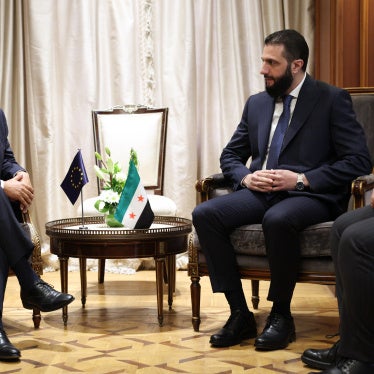(New York) - The Tunisian authorities should quash the convictions against a journalist and an activist for their involvement in protests against unemployment and other grievances in a mining region of Gafsa province in 2008, Human Rights Watch said today. Fahem Boukadous and Hassan bin Abdullah were convicted after unfair trials in which the defense was not allowed to present witnesses. Their appeals are scheduled for April 27, 2010.
Boukadous, a journalist, was convicted on charges arising solely from his reporting about the events. Both he and activist Hassan bin Abdullah were sentenced to four years in prison in December 2008. Theirs are the last remaining open cases from the protests, in which hundreds of people were arrested and sentenced in unfair trials. All except nine of those convicted and imprisoned have since been conditionally released.
"The unfair trials from the Gafsa episode exposed the authorities' real intention, to silence anyone who speaks out against repression, or even reports about protest, " said Sarah Leah Whitson, Middle East and North Africa director at Human Rights Watch. "The authorities need to correct this injustice by quashing the convictions against Boukadous and bin Abdullah."
Beginning in January 2008, thousands of people took to the streets in several towns in the southern province of Gafsa, to protest joblessness and what they saw as nepotism in hiring by the Gafsa Phosphate Company, the region's main employer. The police arrested up to 500 people between April and July, torturing many during interrogation, protesters told Human Rights Watch. About 200 people were put on trial in connection with the uprising, including journalists, protesters, and the trade unionists who led the movement. They were sentenced to prison terms of up to eight years.
Boukadous, of the independent Tunisian satellite television station al-Hiwar Attounsi based in Italy, covered the protests and was one of the main sources of video footage during the unfolding events.
On December 11, Boukadous and bin Abdullah, a member of a regional coalition for unemployed university graduates who disseminated information about the events, were sentenced by the Gafsa Court of First Instance to six years and ten years in prison respectively on charges of "spreading information liable to disrupt public order" and "belonging to a criminal enterprise established to prepare or commit an attack against people or property." Tunisian authorities commonly use these charges to convict peaceful protesters, including many involved in the 2008 events.
Boukadous, who went into hiding for 17 months to avoid being arrested on what he considers to be politically motivated charges, and bin Abdullah were sentenced in absentia; other defendants were present at the trial and also received prison terms.
The judge presiding over the trial prevented defense lawyers from presenting their arguments in court and rejected their requests to call witnesses. In addition, the defendants present were not questioned in court, and the judge refused to investigate their allegations of torture during interrogation.
During the trial, the court found that Boukadous was not an active participant in the protests, but judged him guilty of spreading news about the protests within Tunisia and abroad, which the court characterized as dangerous propaganda. The "criminal enterprise" that Boukadous and bin Abdullah were charged with belonging to refers to the organization of the protests, which were largely peaceful. The defense team had identified witnesses ready to testify that neither Boukadous nor bin Abdullah participated in the few eruptions of violence.
Following a presidential pardon on November 4, 2009, in which most prisoners detained in connection with the protests were released, Boukadous and bin Abdullah requested retrials. This is a right available to defendants who had been convicted in absentia and who subsequently present themselves to the authorities.
Boukadous and bin Abdullah were retried on January 13 and March 17, 2010, respectively, with heavy police presence. The Gafsa Court of First Instance convicted them again on the same charges but reduced their sentences to four years each. The court prevented any of the men's lawyers from making their oral arguments in defense of their clients and did not call on any witnesses.
At the trial, Boukhadous's defense lawyers insisted that they be allowed to make their oral arguments and also pressed the court to present a copy of his previous record, which is legally required in order for the court to deliver a sentence. The judge adjourned the trial, saying he would look into these matters. He promptly came back, without allowing the defense to speak further, and handed down the four-year sentence.
The court granted Boukadous pre-trial release pending the appeal but kept Ben Abdallah imprisoned.







